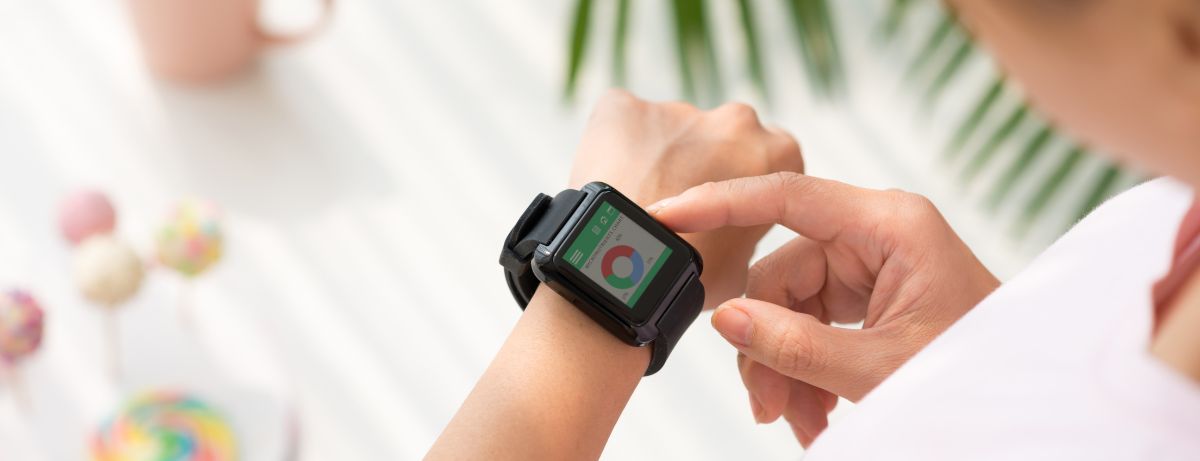15% off €35 OR 20% off €45
What’s the future of wellness technology?

What’s the future of wellness technology?
While wellness technology might conjure up an image of futuristic gadgets, it is worth noting that the Leonardo da Vinci is credited with inventing the first step counter1. However, it was not until the 1960s when scientists studied and validated the relationship between physical activity to health.
While we might have the devices and vast amounts of information from smart devices, we are still learning about what meaningful information we might get from these gadgets- even though wearing a smartwatch now comes as naturally as putting our socks on.
As science and technology improves, you can expect that we will be able to understand our individual health needs better than before- from tracking our daily diet to predicting our long-term health risks.
Skip to:
- Isn’t it a bit nosy?
- What could it involve?
- Smart patches
- CO2 metabolism monitors
- Healthy “nudges” while you shop
- What’s next for wellness tech?
Isn’t it a bit nosy?
Potentially! It can be daunting to get your head around the fact that a gadget can know more about what is going on in your body more than you and it is certainly not for everyone.
But, with wellness technology gaining more data, some companies are able to calculate your risk of being diagnosed of over 800 medical conditions through wearables such as your smartwatch2.
Not only can some of these gadgets highlight your risk but they can help track your health and guide you to reduce your chances of getting unwell. Just take the latest feature, AFib of the Apple Watch as an example. People who are diagnosed with atrial fibrillation can turn on this feature to access information such as how often their heart rhythm is erratic and highlight lifestyle factors that might be linked to this such as sleep, alcohol consumption and exercise3.
Finally, some of these technologies can help with specific health goals such as:
- Improving your sleep
- Losing, maintaining, or gaining weight
- Helping to meet athletic goals
- Regulating your stress levels
While you could get some of this information about your health from your doctor, wellness technology is designed to monitor you in real time and provide you actionable insights personalised for you, based on the data that is captured using whichever device you choose.
And – just like a watch- you can take it on or off as you please.
What could it involve?
Our Wellness Trends Report predicts that we’ll be using wellness tech more than ever in the coming year, both in medical settings and at home.
We’ll be looking at our individual immune responses and understanding how factors like our microbiome could make our health differ from others.
No longer is personalised nutrition just for elite athletes; wearable technology, blood and breath tests, as well as even DNA testing will now be more accessible and available for everyone to understand and act on their health.
Here are just some of the innovations that could lead the way for wellness tech…
Patches preventing toxic overdoses in hospitals
All this innovation in technology is not limited to tracking a workout or analysing a nap, there are some technologies that can truly improve outcomes in medical care.
Take the world’s first “smart patch” being developed by Australian company Nutromics. This company has developed a patch with tiny microneedles and DNA sensors that provide real-time results of ranges of medication in the blood.
Current practice for patients receiving certain medication is to monitor the drug levels through blood tests but it can take hours to analyse the test, and by the time the results are back, the levels in the body might be different to the reading on the results. This constant lag between test time and results can lead to incorrect dosages of usually safe drugs, which can have serious and even life-threatening effects4.
Nutromics provides instant calculation of safe, accurate doses of medication, which can minimise the risk of toxic overdoses.
Breath devices using CO2 for personalised nutrition
Regular exercise and a balanced diet are the foundations to keeping your body at its healthiest, right? Well, unfortunately it is not that simple.
Why is it that one individual can eat anything they like and still stay within their recommended weight range and some feel the pounds piling on the minute they try a slither of cake? Metabolism is one of the factors that influences this. It is the process that dictates the speed our body burns calories and turns them into energy5. Everyone has a different metabolic rate and this usually is determined by factors such as age, genetics, lifestyle, gender and hormones. It goes without saying that not all of them can be controlled but fear not, some are definitely within our gift to manage.
Enter Lumen, a nutritional tech company that claim to have the key to “hacking” your metabolism. Just put on their smart wristband, then breathe into their whistle-shaped device for 5 minutes.
The breath device measures the amount of CO2 in the user’s breath and identifies whether the body is primarily burning carbohydrates or fat for fuel. Using this data, it offers personalised recommendations on what to eat and what to potentially avoid on that day6. The goal is to improve your metabolism, like you’d strengthen a muscle, over time to help develop “metabolic flexibility”7.
If weight loss or maintaining your weight is your goal, having a flexible metabolism can help you do so in a way that’s more sustainable long-term. Lumen says that by improving your body’s ability to burn fat, you’re more likely to stay full between meals6.
An optimal metabolism can help your body stay healthy, but if that is not enough of a reason for you to prioritise your metabolic health, researchers suggest that there is also a potential link between metabolic health and mental health8. While sometimes this is due to the side effect of some medications, sometimes, it may be the contributing factor as well.
Handpicked content: Your guide to basal metabolic rate (BMR)
Healthy “nudges” while you shop
One of the biggest barriers to adoption of healthful behaviours is the fear of total transformation. But healthy living is all about a nudge in the right direction. Nudges are subtle changes to framing information that can significantly influence behaviour without restricting choice9. And when you can get some personalised nudges to help you make choices that are better for you, what’s not to like?
Wellness technology company DnaNudge has launched three programs, Nutrition Nudge, Skincare Nudge, and Active Nudge, to enable you to personalise your lifestyle choices using your own DNA to guide you- from food, skincare to activity.
After submitting a cheek swab, DnaNudge delivers a personalised report to your smartphone.
For nutrition, the Nutrition Nudge calculates your sensitivity to macronutrients like carbohydrates, fat, caffeine, and salt. It can also identity your predisposition to certain health conditions based on your DNA sample10.
For your skin, the Skincare Nudge analyses your susceptibility to certain factors like dehydration, oxidative stress, and collagen degradation11.
Then, your service will recommend or steer you away from products when you shop. If you’re buying food, the Nutrition Nudge app (or another, wearable device called the DnaBean) will turn red (recommended) or green (not recommended) when you scan a product barcode.
It’s the same if you have the Skincare Nudge service: scan a beauty product and it’ll show you whether it’s right for your skin.
What’s the future of wellness tech?
There is no stopping the growth of the wellness industry12. From the accelerated march to care in the community, expect more healthcare at home devices where hospitals are spaces reserved for only the more serious and invasive procedures. Fitness, sleep, beauty and nutrition are all undergoing a data revolution- there is a wealth of information about our health out there, if we choose to find out.
The next phase is all about being able to distinguish signal from the noise. As more gadgets and gizmos enter the market, it is now down to the customer to choose who they want to share their data with and whether this solves their health need.
While we are not yet in the future where everything about our health can be predicted accurately, it is definitely possible to optimise our lives with the help of these innovations.
The advice in this article is for information only and should not replace medical care. Please check with your GP or healthcare professional before trying any supplements, treatments or remedies. Food supplements must not be used as a substitute for a varied and balanced diet and a healthy lifestyle.
Last updated: 15 December 2022
- https://www.ncbi.nlm.nih.gov/pmc/articles/PMC5488109/#CR6
- https://qumata.com/solutions/how
- https://www.apple.com/uk/newsroom/2022/06/watchos-9-delivers-new-ways-to-stay-connected-active-and-healthy/
- https://www.nutromics.com/
- https://my.clevelandclinic.org/health/body/21893-metabolism
- https://www.lumen.me/
- https://pubmed.ncbi.nlm.nih.gov/28467922/
- https://pubmed.ncbi.nlm.nih.gov/18041878/
- https://journalofethics.ama-assn.org/article/designing-nudges-success-health-care/2020-09
- https://www.dnanudge.com/pages/nutrition-nudge
- https://www.dnanudge.com/pages/skincare-nudge
- https://www.mckinsey.com/industries/consumer-packaged-goods/our-insights/wellness-in-2030



